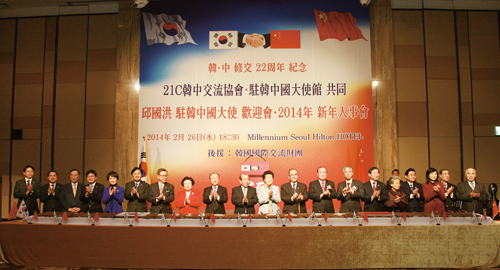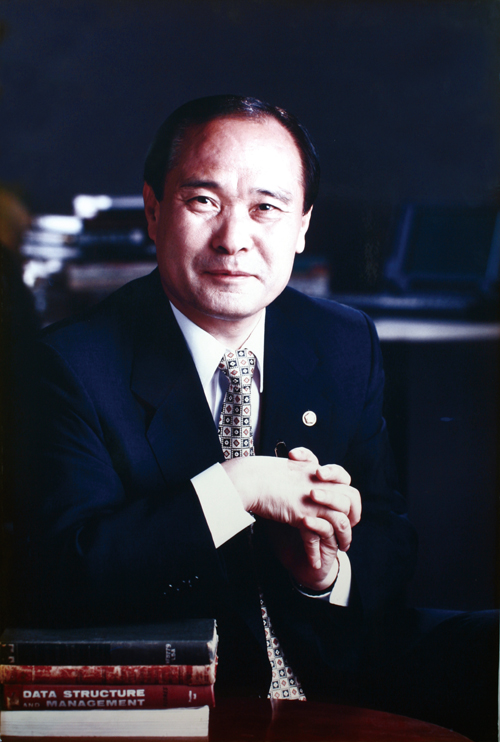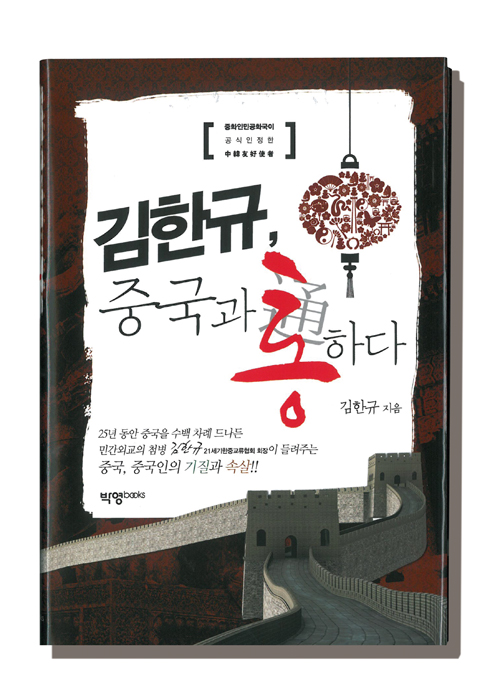Chmn. Kim, a China expert, touches on China’s rising role in the unification of the Korean Peninsula

Korean and Chinese dignitaries attend an event to welcome newly appointed
Chinese Ambassador to Korea Qiu Guohong at the Seoul Hilton Hotel on Feb. 26,
which was organized jointly by the Chinese Embassy and the Korea China Leaders Society.
By Oh Chung-sook
Chairman Kim Han-kyu of the Korea China Leaders Society, a former minister of government administration and an ex-lawmaker, has a 25-year track record of shuttling between Korea and China and inviting Chinese leaders to Korea.
His recently released book, “Kim Han-kyu Communicates with China,” takes a look into what today’s China is like and sheds insight into the future direction of Korean-Chinese relations, Chinese civilization, Chinese philosophies, and Chinese dispositions.
The Chinese Embassy and the Korea China Leaders Society jointly hosted an event to welcome newly appointed Chinese Ambassador to Korea Qiu Guohong at the Seoul Hilton Hotel on Feb. 26 in sponsorship with the Korea Foundation. The New Year’s gathering also coincided with an event to celebrate the publication of Chairman Kim’s book. Prior to the New Year’s gathering, Kim said it will also serve as a meaningful occasion for new Chinese Amb. Qiu to meet with former and current Korean leaders, adding that he hoped Korean-Chinese ties will see dramatic changes this year, the second year since both Korean President Park Geun-hye and Chinese President Xi Jinping were inaugurated.
Recognizing the significance of Korea’s relationship with China from both the historical and geographical perspectives in line with the so-called nordpolitik, a foreign policy initiative of former President Roh Tae-woo with the goal of normalized ties with China and the former Soviet Union, Chairman Kim has been heading the Korea China Leaders Society since 2000.
Kim sees improvement of civilian exchanges between South Korea and China as his mission of the times since the unification of the Korean Peninsula is impossible without support from China and the United States. He said unification of the two Koreas is a matter in which China’s concern and support are absolutely required since it is not easy for the two Koreas to hold direct talks. Government-to-government ties between Korea and China are as important as exchanges of civilian leaders. Kim believes it is desirable for Korea to realize unification with support from China, which attaches priority to civilian exchanges.
The Korea China Leaders Society is a civilian organization established to promote exchanges and friendship between Korean and Chinese leaders following former Chinese Premier Zhu Rongji’s visit to Korea as China’s chief delegate to the Asia-Europe Meeting (ASEM) in October 2000.

Chairman Kim Han-kyu
(photos: courtesy of Korea China Leaders Society)
The society set up sisterhood ties with the Chinese People’s Diplomatic Society, nicknamed the 2nd Chinese Foreign Ministry, on Nov. 29, 2000. It now sponsors the top five Korean-Chinese forums, including the Korea-China Leaders’ Forum with a membership of bipartisan Korean and Chinese leaders in various fields, the Korea-China Women Leaders’ Forum, the Defense Security Forum, which made its debut in 2009, and the Top-Ranking Journalists Forum, which was launched in 2006.
Chairman Kim’s commitment to improve Korea-China exchanges traces back to his trip to China in 1987 as a parliamentarian member of a Korean delegation to persuade China to participate in the 1988 Seoul Summer Olympics, remembered as a signature Olympiad of the East-West thaw with the largest-ever number of communist-bloc country participants in the Cold War era.
One of examples showing improved Korean-Chinese relations is the recent opening of the Korean patriot Ahn Jung-geun Memorial Hall in the VIP section of Harbin Station where he shot and killed the Japanese governor of Korea, Hirobumi Ito, on Oct. 26, 1909.

The recently published book,
“Kim Han-kyu Communicates with
China” by Chairman
Kim Han-kyu of the Korea China Leaders Society.
Chairman Kim said Chinese President Xi maintains amicable personal ties with Korean President Park, and if the Chinese leader visits Korea in June or July, Korea and China are mostly likely to be inching toward the signing of a free trade agreement by 2015 at the latest. Kim estimates the economic effects a Korea-China FTA will bring to Korea at some 4 trillion won. If the Korea-China FTA goes into effect and China achieves its goal of 7.7 percent annual average growth during President Xi’s reign, he said, Korea is forecast to see its trade with China surge three or four times. The chairman predicted that China’s rising role will be conducive to improving inter-Korean ties, thus contributing to the unification of the Korean Peninsula.
